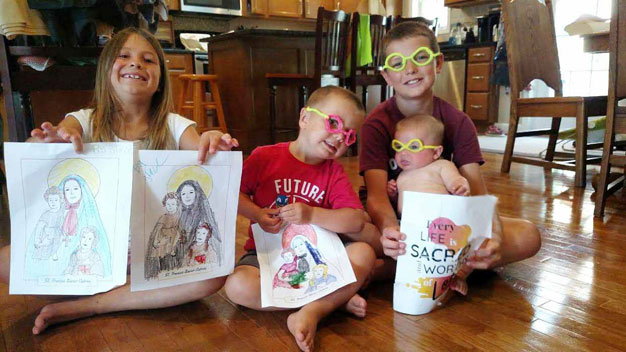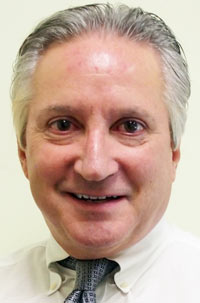
Grace, John, Matthew and Thomas Phillips explored the Catholic Social Teaching theme Life and Dignity through St. Frances Xavier Cabrini and the story of David. Families of St. Mary Parish in Oskaloosa participated in the program online.
Annual Diocesan Appeal kicks off Sept. 26-27
By Anne Marie Amacher
The Catholic Messenger
“Faith formation is not coming to a halt. We can strengthen the Catholic faith,” said Jeri Bollwitt, director of religious education at St. Mary Parish in Solon.
With the coronavirus pandemic still a major concern, the Office of Faith Formation of the Diocese of Davenport has been working for months on faith formation and youth ministry programming for the 2020-21 school year. The Annual Diocesan Appeal, which kicks off officially the weekend of Sept. 26-27, funds the Faith Formation Office, among many other diocesan entities. This year’s theme is “Christ has no body but yours.”
Related: ADA is a way to give back
Rosina Hendrickson, lifelong faith and lay ministry formation coordinator for the diocese, said the Faith Formation Office developed guidelines for new programming for non-gathered or virtual approaches. The document states, “A traditional classroom-based model for faith formation, where students gather weekly at the parish with a catechist, is not preferred at this time.”
All directors and coordinators of religious education, and youth ministry leaders, were invited to dialogue with the Faith Formation Office to look at adapting programs and preparing students for reception of the sacraments. Nearly half of the parishes in the diocese favored two main programs identified within the Faith Formation document: a family-based diocesan curriculum or an online learning management system.
The family-based diocesan curriculum includes a series of 15- to 20-minute mini lessons around a specific theme, Hendrickson said. “It is designed to be parent/family-led and embraces the baptismal call of parents to be the first witnesses of the faith of their children.” Each mini-lesson has a teaching moment, followed by discussion and/or activity. Parishes may also adopt an accountability project to check in with families about the material. “Just like any curriculum, the parish determines exactly how they are going to implement the material,” Hendrickson said. Materials for the family-based curriculum are available in English, Spanish and Vietnamese.
Other families chose an online learning management system. Students work through the lessons online and software tracks what they have completed. “Some parishes are electing to hold Zoom sessions with a catechist leading students through breaking open the lesson material, utilizing a flipped classroom model, or having a catechist teach a lesson during a Zoom session.”
About a year ago, Bollwitt began looking at online options for the Solon parish because of the number of snow days she noted since moving to Iowa. She talked with Hendrickson, who was interested in a curriculum Bollwitt was exploring. The two got together to review the books and online options. “I was ahead of the curve,” Bollwitt said. Solon chose a curriculum that includes online training, videos, parental access and student access. “The resources are built in,” she said.
Sister Cheryl Demmer, PBVM, looked into faith formation options for youths at Ss. Mary & Mathias Parish in Muscatine, St. Joseph Parish in Columbus Junction and St. Mary Parish in Wilton. She is director of religious education at Muscatine and Wilton and assists at Columbus Junction. In April, she connected with a representative from a company regarding an online program. After participating in many webinars, Sister Demmer met with Tommy Fallon, the Muscatine parish’s youth and young adult minister. “We spent a morning brainstorming as to how our faith formation year was going to look,” she said. Fallon also reviewed the webinars and the two decided which program would work best for parents and students. Pastors, a parochial vicar, and religious education staff from the parishes participated in workshops to learn about the program. Parents will participate in training this month.
“I truly believe Vision 20/20 will become most alive when parents, who are the first witnesses of faith to their children, sit with their children and pray and learn together and that a new resurgence of faith will happen in our Catholic Church,” Sister Demmer said.
Kelley Tansey, director of religious education at St. Alphonsus Parish in Mount Pleasant, said families would receive a month’s worth of materials before classes start in October. For families without internet access, hard copies will be provided. “They will be able to work through the material at their own pace and according to their family schedule. They are to complete all the required activities by the end of the month and provide proof of completion,” she said. This could include photographs or videos of their projects. Some examples are a picture of the home prayer space or a video of the family reciting the rosary together.
Even when in-person classes resume, she hopes to keep a monthly family gathering.
Trevor Pullinger, pastoral associate at All Saints Parish in Keokuk and parish life coordinator at St. Joseph Parish in Montrose, has worked five years to offer family-based faith formation. He found that students who had strong family faith practices performed much better in the classroom regardless of class attendance.
The journey to family-based faith formation began with open discussion and examination of what All Saints had been offering. Through surveys and town hall meetings, the program has been rolled out over time. When the pandemic hit, “we immediately transitioned into remote sessions and didn’t miss a beat.”
The faith formation programs gather as a large group the first Wednesday of the month through Zoom, except in January. Parish leaders also schedule one-on-one mentor family check-ins to see how things are progressing, answer questions and get feedback. “Because we are remote and focused on Christian prayer, we were able to partner with an app developer to provide each family with a subscription to Hallow Plus, which promotes healthy prayer habits as well as Catholic prayer and meditation practices.”
Shannon Greiner, director of religious education at Holy Trinity Parish in Keokuk, learned about options from the Faith Formation Office and talked with Bollwitt. She also helped lay the groundwork for St. Mary Parish in Sigourney. Students in grades K-6 will go online by the end of the month and teachers will make phone calls to check in with students and parents monthly. Students who are preparing for reconciliation and first Communion will meet in person in the parish center because classes are small and students can be physically distant. The confirmation class is much larger and will meet in the school gyms and parish centers. Grades 7-8 classes will meet via Zoom or Google Hangout and use Google Classroom as the platform.
Crystal DeNeve, director of faith formation, and Deb Molitor, PK-6 coordinator at St. Mary Parish in Grinnell, chose the family formation program because “they aligned with the overall teachings of the church and because they can be used easily with an entire family.” The parish began moving toward a family model last year with various activities. They offered training to family coaches who will be assigned up to six families to meet with virtually on a monthly basis to present new materials and discuss how sessions are going.
Samantha Ridder, director of faith formation at St. Mary Parish in Oskaloosa, said family faith formation is an opportunity to encourage what happens naturally. “Our families started bringing the Catholic faith into their homes in a new and exciting way last March. There was a natural longing there that we wanted to encourage and build on.” Ridder said the curriculum emphasizes building a foundation of prayer. Families will team up to encourage each other on the journey. “That journey looks different for every family.”







